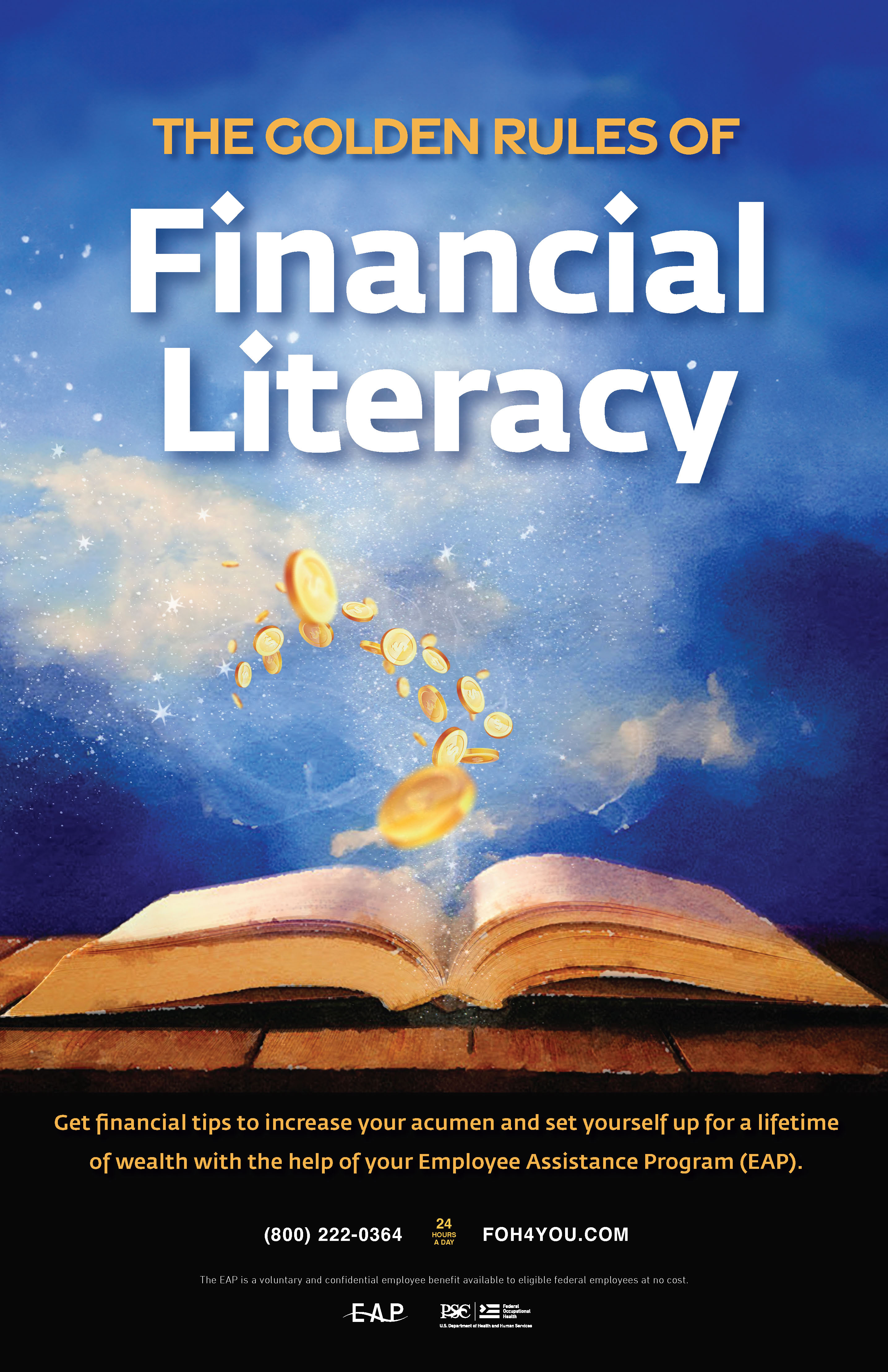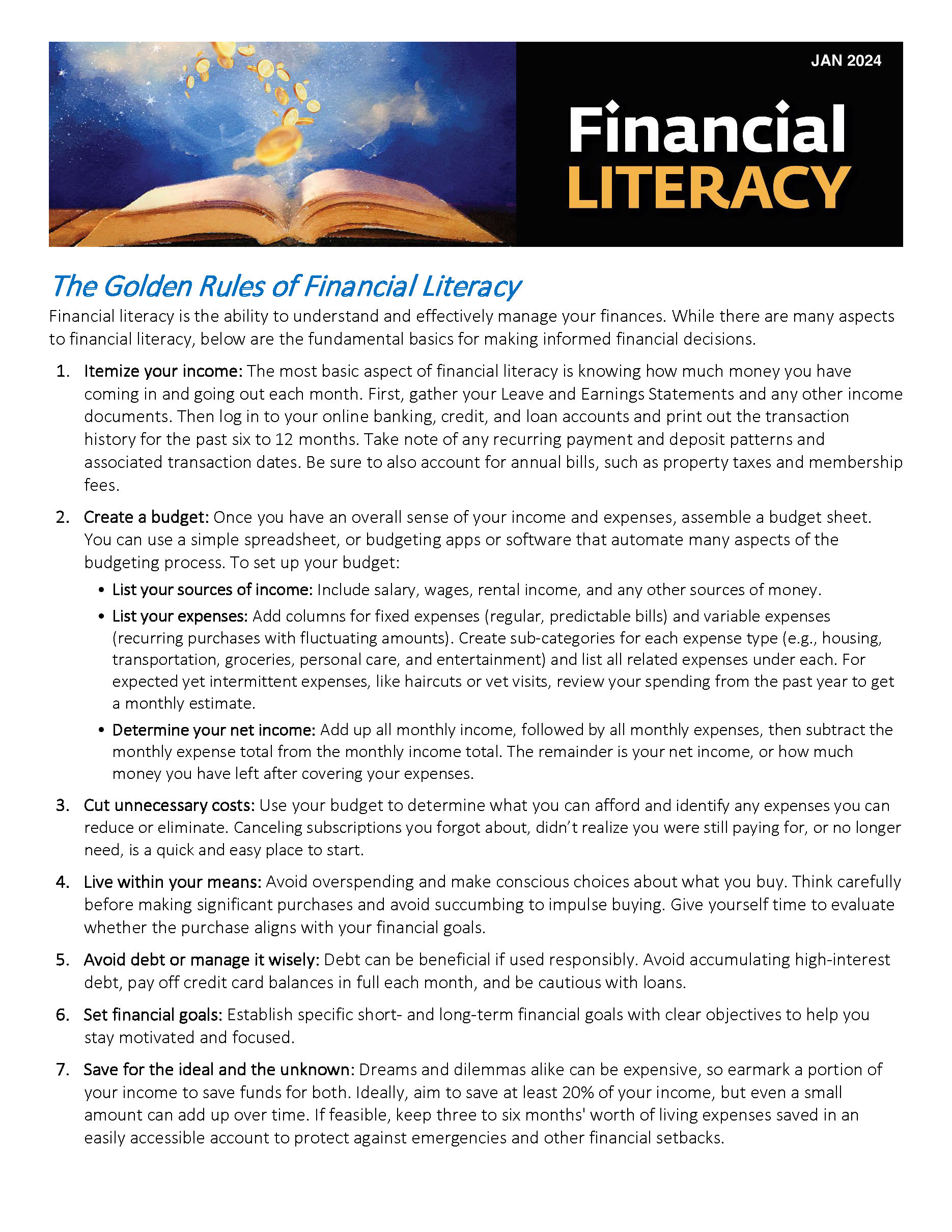
Financial literacy is the ability to understand and effectively manage your finances. While there are many aspects to financial literacy, below are the fundamental basics for making informed financial decisions.
- Itemize your income: The most basic aspect of financial literacy is knowing how much money you have coming in and going out each month. First, gather your Leave and Earnings Statements and any other income documents. Then log in to your online banking, credit, and loan accounts and print out the transaction history for the past six to 12 months. Take note of any recurring payment and deposit patterns and associated transaction dates. Be sure to also account for annual bills, such as property taxes and membership fees.
- Create a budget: Once you have an overall sense of your income and expenses, assemble a budget sheet. You can use a simple spreadsheet, or budgeting apps or software that automate many aspects of the budgeting process. To set up your budget:
- List your sources of income: Include salary, wages, rental income, and any other sources of money.
- List your expenses: Add columns for fixed expenses (regular, predictable bills) and variable expenses (recurring purchases with fluctuating amounts). Create sub-categories for each expense type (e.g., housing, transportation, groceries, personal care, and entertainment) and list all related expenses under each. For expected yet intermittent expenses, like haircuts or vet visits, review your spending from the past year to get a monthly estimate.
- Determine your net income: Add up all monthly income, followed by all monthly expenses, then subtract the monthly expense total from the monthly income total. The remainder is your net income, or how much money you have left after covering your expenses.
- Cut unnecessary costs: Use your budget to determine what you can afford and identify any expenses you can reduce or eliminate. Canceling subscriptions you forgot about, didn’t realize you were still paying for, or no longer need, is a quick and easy place to start.
- Live within your means: Avoid overspending and make conscious choices about what you buy. Think carefully before making significant purchases and avoid succumbing to impulse buying. Give yourself time to evaluate whether the purchase aligns with your financial goals.
- Avoid debt or manage it wisely: Debt can be beneficial if used responsibly. Avoid accumulating high-interest debt, pay off credit card balances in full each month, and be cautious with loans.
- Set financial goals: Establish specific short- and long-term financial goals with clear objectives to help you stay motivated and focused.
- Save for the ideal and the unknown: Dreams and dilemmas alike can be expensive, so earmark a portion of your income to save funds for both. Ideally, aim to save at least 20% of your income, but even a small amount can add up over time. If feasible, keep three to six months' worth of living expenses saved in an easily accessible account to protect against emergencies and other financial setbacks.
- Plan for retirement: Start saving for retirement as early as possible. Contribute to retirement accounts, like individual retirement accounts (IRAs) and your Thrift Savings Plan (TSP), and make the most of employer-matched contributions available to you or your spouse.
- Invest intelligently: Research various investment options and consider investing for the long term. Diversify your investments to spread risk and consult with a financial advisor if needed.
- Continually educate yourself: Financial markets and regulations change over time. Stay informed about financial news, investment options, and changes in tax laws.
- Seek professional advice: If you're unsure about a financial decision or need direction, consult with a certified financial planner or advisor who can provide guidance on your unique situation.
Improving your financial literacy is an ongoing process. Continually expanding your financial knowledge and money management skills empowers you to make better choices toward achieving your goals.
Download the Campaign
|
PDF Newsletter |
PT Newsletter |
|
For additional support, financial services are available through your Employee Assistance Program (EAP). Call to schedule a free consultation with a financial expert who can help you identify your needs and provide information on a variety of financial topics. 24 HOURS A DAY
The EAP is a voluntary and confidential employee benefit available to eligible federal employees at no cost. |





